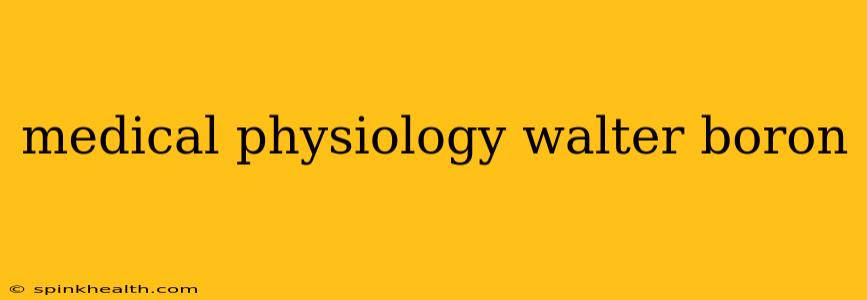For generations of medical students and physiology enthusiasts, the name Walter Boron resonates with authority and excellence. His contributions to the field, particularly through his monumental textbook Medical Physiology, have shaped the understanding and teaching of this crucial subject. But what makes Boron's work so impactful? What makes his book stand out from the myriad of physiology texts available? This deep dive explores the legacy of Walter Boron and the enduring relevance of his Medical Physiology.
Imagine a world where the intricate workings of the human body remain a mystery. Without a solid grasp of physiology, the practice of medicine would be akin to navigating a ship without a chart. This is where Walter Boron's work comes in. His Medical Physiology, often described as comprehensive and meticulously detailed, serves as a guiding light, illuminating the complex mechanisms that keep us alive and functioning.
What makes Walter Boron's Medical Physiology so Special?
Boron's Medical Physiology isn't just another textbook; it's a journey into the heart of human biology. What distinguishes it from other texts is its remarkable blend of depth, clarity, and clinical relevance. It's a book that manages to be both incredibly detailed and surprisingly readable, a feat rarely achieved in scientific literature.
What are the Key Concepts Explained in Boron's Medical Physiology?
Boron's book covers the entire spectrum of medical physiology, from the cellular and molecular levels to the integrated functions of organ systems. Key areas explored include:
-
Cellular Physiology: This section delves into the fundamental processes occurring within individual cells, such as membrane transport, signal transduction, and energy metabolism. Understanding these building blocks is essential for grasping the more complex workings of organs and systems.
-
Neurophysiology: The nervous system's complexities are unravelled, covering topics such as action potentials, synaptic transmission, sensory perception, and motor control. This section provides a foundational understanding of how the brain and nervous system orchestrate bodily functions.
-
Cardiovascular Physiology: This segment explores the intricate workings of the heart and circulatory system, including cardiac muscle physiology, blood pressure regulation, and the dynamics of blood flow. The clinical implications of cardiovascular function are highlighted throughout.
-
Respiratory Physiology: The mechanisms of gas exchange, ventilation, and oxygen transport are comprehensively explained, providing a basis for understanding respiratory diseases and their treatment.
-
Renal Physiology: This section dives into the fascinating world of kidney function, covering glomerular filtration, tubular reabsorption and secretion, and the regulation of fluid and electrolyte balance. The crucial role of the kidneys in maintaining homeostasis is emphasized.
-
Gastrointestinal Physiology: This part explores the complex processes involved in digestion, absorption, and nutrient metabolism. The interplay between the gastrointestinal tract and other organ systems is highlighted.
-
Endocrine Physiology: The intricate world of hormones and their actions on various tissues and organs is explored, emphasizing the role of the endocrine system in regulating metabolism, growth, and reproduction.
-
Reproductive Physiology: This area delves into the physiology of reproduction in both males and females, including gametogenesis, fertilization, and pregnancy.
Is Boron's Medical Physiology Difficult to Understand?
While the subject matter is inherently complex, Boron's writing style aims for clarity and accessibility. The book uses diagrams, illustrations, and clinical examples to make complex concepts easier to grasp. However, it's crucial to acknowledge that this is a comprehensive text intended for medical students and professionals. A strong foundation in biology and chemistry is highly recommended.
How Does Boron's Medical Physiology Compare to Other Physiology Textbooks?
Many excellent physiology textbooks are available, each with its own strengths. However, Boron's Medical Physiology is often lauded for its comprehensive coverage, detailed explanations, and clinical relevance. It's a text that provides both depth and breadth, making it a valuable resource for students and professionals alike.
What are the Key Differences Between Boron's Medical Physiology and Other Texts?
The key difference often cited lies in its level of detail and the depth of explanation offered for each physiological process. Other texts might offer a broader overview, while Boron’s delves into the underlying mechanisms with exceptional clarity.
Conclusion: A Legacy of Excellence
Walter Boron's Medical Physiology stands as a testament to his dedication to clarifying and advancing our understanding of human physiology. It's a book that has educated generations of medical professionals, and its influence continues to shape the field today. Its enduring relevance lies in its ability to present complex concepts with clarity, detail, and clinical relevance, providing a foundational understanding essential for anyone aspiring to a career in medicine or related fields. Whether you're a seasoned medical professional or a student just beginning your journey, exploring the world of physiology through the lens of Walter Boron is an experience that will undoubtedly enhance your knowledge and appreciation of this vital field.

